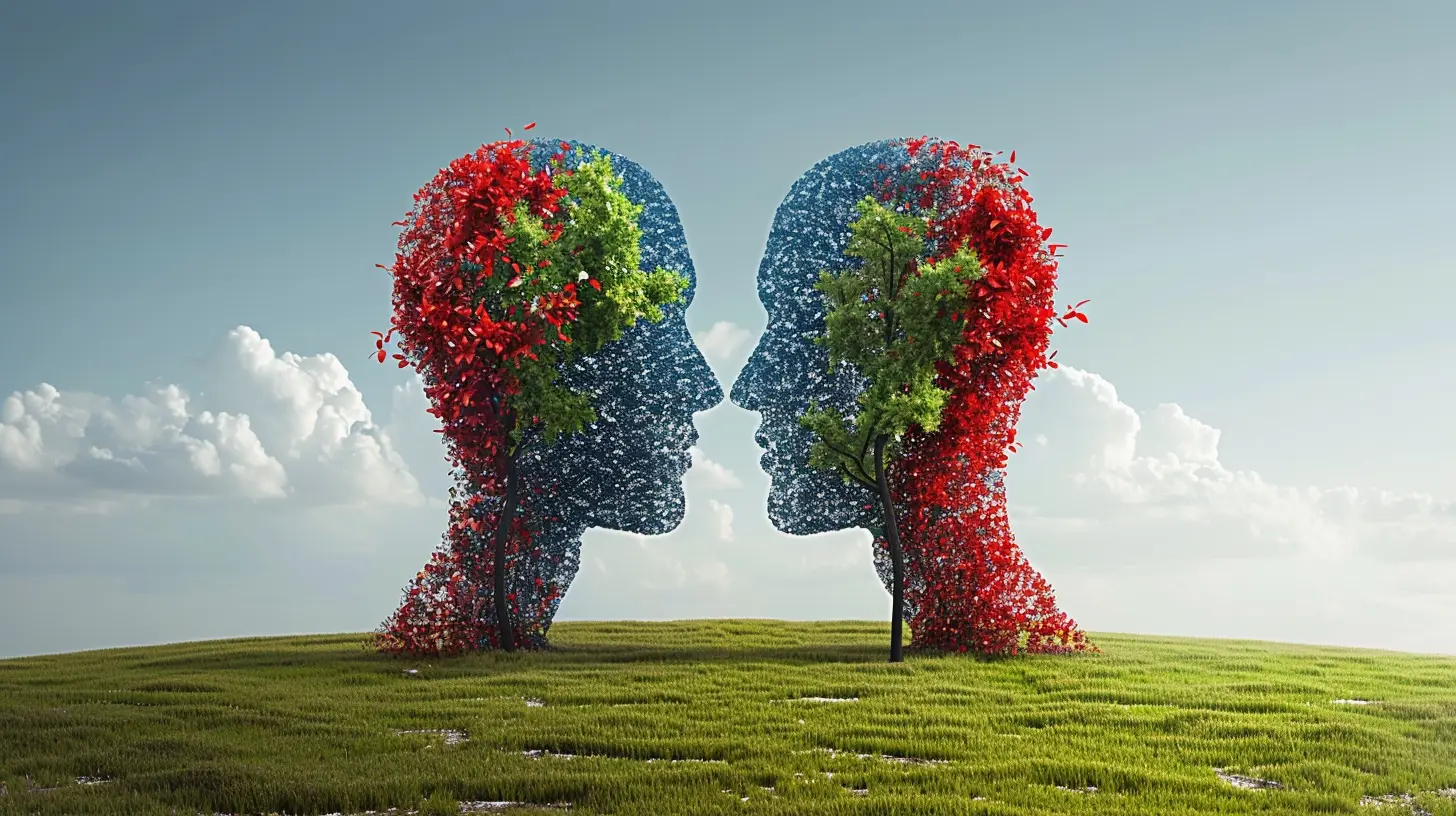Nature vs. Nurture: The Debate in Cognitive Development
10 October 2025
When it comes to understanding how we think, learn, and grow mentally, the age-old debate of nature vs. nurture is never far behind. Are we born smart, curious, socially adept? Or do we become these things because of the world around us? The answer, as with most psychological questions, isn’t black and white. It’s more like a messy, colorful paint palette with layers that overlap—and sometimes clash.
Let’s unpack this heated debate in cognitive development, and break down exactly how our genetics and environment shape our minds from the moment we're born (and even before that!).
What’s the Nature vs. Nurture Debate All About Anyway?
This debate has been around for centuries. Philosophers like Plato argued that we’re born with certain traits, while others like John Locke believed the mind is a blank slate—ready to be written on by life’s experiences.Fast forward to today, and psychologists and neuroscientists are still trying to untangle the influence of genes (nature) and environment (nurture) on our cognitive development. Spoiler alert: It’s both. But the real discussion lies in how much each contributes and under what circumstances.
Cognitive Development: A Quick Refresher
Before diving deeper, let’s clarify what we mean by "cognitive development." This term refers to how we learn, think, reason, problem-solve, remember, pay attention, and use language. From babbling babies to elderly folks doing crossword puzzles, cognitive development spans a lifetime—but it’s especially critical in childhood.Jean Piaget, one of the most influential psychologists in this area, believed children go through specific stages of cognitive development. His ideas laid the groundwork for much of what we know today—but even he couldn’t ignore the influences of both biology and experience.
The "Nature" Side: Born This Way
Feeling smart might sometimes seem like a natural talent—and to some extent, it is. That’s the argument for nature.1. Genes and Cognitive Abilities
Your DNA carries a blueprint for how your brain develops. Cognitive traits like memory capacity, attention span, even IQ, have hereditary components.Ever heard someone say, “You get your math skills from your dad” or “She’s a natural reader”? Well, they may not be far off. Twin, family, and adoption studies consistently show that genetics play a noticeable role in cognitive abilities.
For example, identical twins raised apart often score similarly on intelligence tests. That’s not just coincidence; it's genetic influence.
2. Brain Structure and Neurology
We’re not just talking about IQ here. Genetic factors influence brain structure too—think size of the cerebral cortex, neuron connections, and even the speed at which your brain processes information.Some people are naturally wired to excel in certain areas. It’s like having a head-start in a marathon—but remember, the track (environment) still plays a part in how far you’ll go.
The "Nurture" Side: Shaped by Experience
Now let’s flip the coin. Just because you’re born with genetic potential doesn’t mean it automatically blossoms. That’s where nurture steps in.1. The Power of Early Childhood Environment
From the moment you're born (and even in the womb), your environment starts shaping your brain. The kind of stimulation you receive, the words spoken around you, the emotional tone of caregivers—all of these things influence how your mind grows.Children raised in enriching, stable environments filled with books, interactive play, and loving support tend to develop better cognitive skills than those in neglectful or chaotic settings.
2. Education and Social Learning
Teaching matters. Schooling, social interactions, and even the shows kids watch can influence how they think and solve problems. Ever watched a child soak up new skills just from watching others? That’s nurture at work.Things like language acquisition, critical thinking, and memory can improve dramatically with exposure and practice. It’s like exercising a muscle—the more you use it, the stronger it gets.
Nature and Nurture Don’t Compete—They Collaborate
Here’s the twist: it's not really a competition. Nature and nurture work together like dance partners. One leads sometimes, the other follows, but the dance only works when both are in sync.Gene-Environment Interaction
This concept suggests that our environment can actually activate or suppress genetic tendencies. For instance, a child might have a genetic predisposition for high intelligence, but without the right environment—say, access to quality education—those genes might not be expressed fully.On the flip side, a stimulating environment might help a child overcome genetic hurdles. So, it’s not set in stone.
Epigenetics: Changing the Game
This is where science gets really cool. Epigenetics is the study of how our environment can literally change the way our genes work—without altering the DNA itself.Think of it like this: your genes are the light switches, and your experiences are the fingers that flip them on or off. Everything from diet and stress levels to exposure to toxins can affect cognitive development through epigenetic changes.
Real-World Examples That Make You Think
Let’s look at a few cases that show this nature-nurture combo in action.1. Language Development
Every child is biologically prepared to learn language. That’s nature. But they need to hear and interact with language in their environment to actually develop those skills. That’s nurture.Ferrell children—those tragically raised without human interaction—often miss critical language windows. That stark difference shows how both elements need to play a role.
2. Intelligence & Socioeconomic Status
Studies show that in wealthier families, genetic factors play a larger role in intelligence differences. In lower-income families, however, environmental factors tend to have a stronger impact.Why? In disadvantaged environments, children’s genetic potential often doesn’t get the chance to shine due to lack of resources, stress, or limited educational opportunities.
The Role of Parenting
Let’s not forget about parenting. The way parents talk, play, and respond to their children plays a big role in shaping cognitive development.Warm, responsive parenting fosters better language skills, emotional regulation, and problem-solving abilities. On the flip side, high-stress or neglectful parenting can hinder development—even if the child has strong genetic potential.
So if you’re a parent reading this—you matter more than you may think.
Nature vs. Nurture in The Digital Age
Now, here's a modern twist to the debate: What about screens, digital learning, YouTube videos, and educational apps?Technology is now a huge part of a child’s environment. Does it help or hurt cognitive development?
Honestly, it depends. In moderation and with interaction, tech can support learning. But too much screen time—especially passive consumption—can impact attention span and cognitive development negatively.
Again, it circles back to balance and how genetic predispositions interact with these newer environments.
So... Who Wins the Debate?
Trick question. There’s no winner.Instead of choosing sides, the focus today is on how nature and nurture intertwine. They’re both vital pieces of the puzzle. Your genetics might give you the piano-playing fingers, but your environment teaches you how to use them to play Mozart—or jazz, or even heavy metal if that’s your style.
What’s more, science is now pushing toward personalized approaches in education and mental health that consider both biological and environmental factors. This holistic view helps us support children (and adults) based on their unique blend of nature and nurture.
Final Thoughts
The nature vs. nurture debate will likely never have a definitive “winner” because it’s not meant to be a battle. Rather, it’s a beautiful dance between biology and experience, each playing its part in shaping who we are, how we think, and how we grow.So next time you wonder why someone thinks the way they do, remember—it’s not just their genes, and it’s not just their environment. It’s an intricate mix of both, working together in an unpredictable, fascinating symphony.
Whether you're a parent, a teacher, or just a curious soul—understanding this interplay can help you foster cognitive growth in yourself and those around you.
all images in this post were generated using AI tools
Category:
Cognitive DevelopmentAuthor:

Jenna Richardson
Discussion
rate this article
1 comments
Zora Wilkins
Nature and nurture are intertwined forces shaping our cognitive development. Dismissing one over the other is shortsighted. It's time to acknowledge that genetics provide a foundation, but experiences mold the structure. Embrace the complexities of both, for understanding the human mind demands a holistic perspective. Let’s stop oversimplifying!
October 13, 2025 at 4:01 PM

Jenna Richardson
Thank you for your insightful comment! I completely agree that a balanced understanding of both nature and nurture is essential for comprehending cognitive development. Embracing their interplay enriches our perspective on the human mind.


